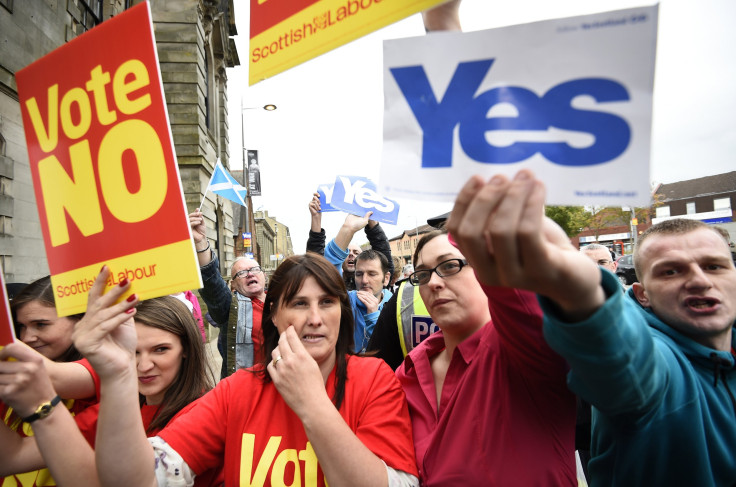Scotland Independence: How Leaders And Activists Are Courting The Vote Right Up To Referendum Day

It seems the closer Scotland gets to its landmark independence referendum, the more uncertain the outcome becomes. With the vote just hours away, both the Yes and No camps are campaigning harder than ever to win over the 10 percent of undecided voters expected to head to the ballot box Thursday. Leaders on both sides have stepped up their rhetoric this week, with the No camp warning of currency crisis, economic uncertainty and diminished power on the world stage, and pro-independence leader Alex Salmond complaining of “fear-mongering.”
The historic campaign is so close that neither side has confidently claimed victory in recent days, with the real possibility that many voters could have a change of heart at polls looming over the election. The latest opinion polls are essentially tied, within the margin of error. At stake is Scotland's future and the 307-year-old union under which Britain became, for a time, the world's most powerful nation, and one of the wealthiest.
David Cameron, Ed Milliband and Nick Clegg, the three major party leaders in the UK Parliament, unveiled Tuesday the so-called “Vow,” a semi-concrete outline of how they plan to fix a number of issues pro-independence Scots have raised without having to break up the union. Unionists said the concessions could swing undecided and even some Yes voters to their side.
“Generally people in Scotland do want change, and I think this sort of idea that they can get more powers and other benefits of staying is very appealing,” a No campaign spokesman said in an email interview.
Meanwhile, the Yes campaign has sought to convince Scots to take the leap and vote for independence. Adam McVey, a Scottish National Party city councilor in Edinburgh and an enthusiastic Yes campaigner, said he and his colleagues have been working to keep up a presence on the streets with informational “street stalls” in “every community across Scotland” and with demonstrations. Yes volunteers have also been calling voters to tell them how to vote and to encourage them to tolerate the long lines expected by both sides.
“The last job to do on Election Day will be to get out the vote, knocking hundreds of thousands of doors across Scotland to make sure Yes supporters have their voice heard,” McVey said in an email interview. “It won't be hard to persuade our supporters to make it to the ballot box, it might be more a case of marshaling the stampede to the voting booth as millions rush to vote for a better Scotland!”
Managing voter turnout is a top priority for both sides. Ben MacPherson, a Yes volunteer, said he and fellow campaigners are visiting undecided voters, and “many have moved to Yes.'”
On the other side of the referendum, pro-union campaigners are making the case to voters that a No vote does not mean keeping the status quo, but rather a vote for change within the UK. More than a dozen former chiefs of the British military told the Sun tabloid Wednesday that an independent Scotland would “weaken us all,” which could also sway the election result.
Other No campaigners have offered more emotional arguments. Former British Prime Minister Gordon Brown, a Scot and a No advocate, gave "the speech of his life" on Tuesday, preferring to focus on the storied history of a united Britain than on the economic issues his side has argued recently.
"What we have built together by sacrificing and sharing, let no narrow nationalism split asunder ever," Brown said. "The vote tomorrow is not about whether Scotland is a nation; we are. Yesterday, today and tomorrow. Let us tell the undecided. The waverers. Those not sure how to vote. Let us tell them what we have achieved together."
A few No leaders have criticized the Yes campaign for “intimidation” ahead of the vote, but the Scottish Police Federation said Wednesday that Scots are have been “overwhelmingly good-natured” throughout the campaign.
Political betting expert Mike Smithson said even he is hesitant to predict the outcome, but that if the Yes camp can get enough people out to the ballot box, they could have a fighting chance.
Six words for Scotland. the ballot paper that could end the UK's three century old Union: pic.twitter.com/oowhpAq0wQ
- Faisal Islam (@faisalislam) September 14, 2014No matter the outcome, the heated rhetoric on both sides suggests Scotland's relationship with the rest of Britain has suffered because of the independence movement. Half of Scottish voters said in a poll published Tuesday that the referendum and the campaign leading up to it has “caused deep divisions within Scotland and has damaged relations between Scotland and the rest of the UK."
© Copyright IBTimes 2024. All rights reserved.





















